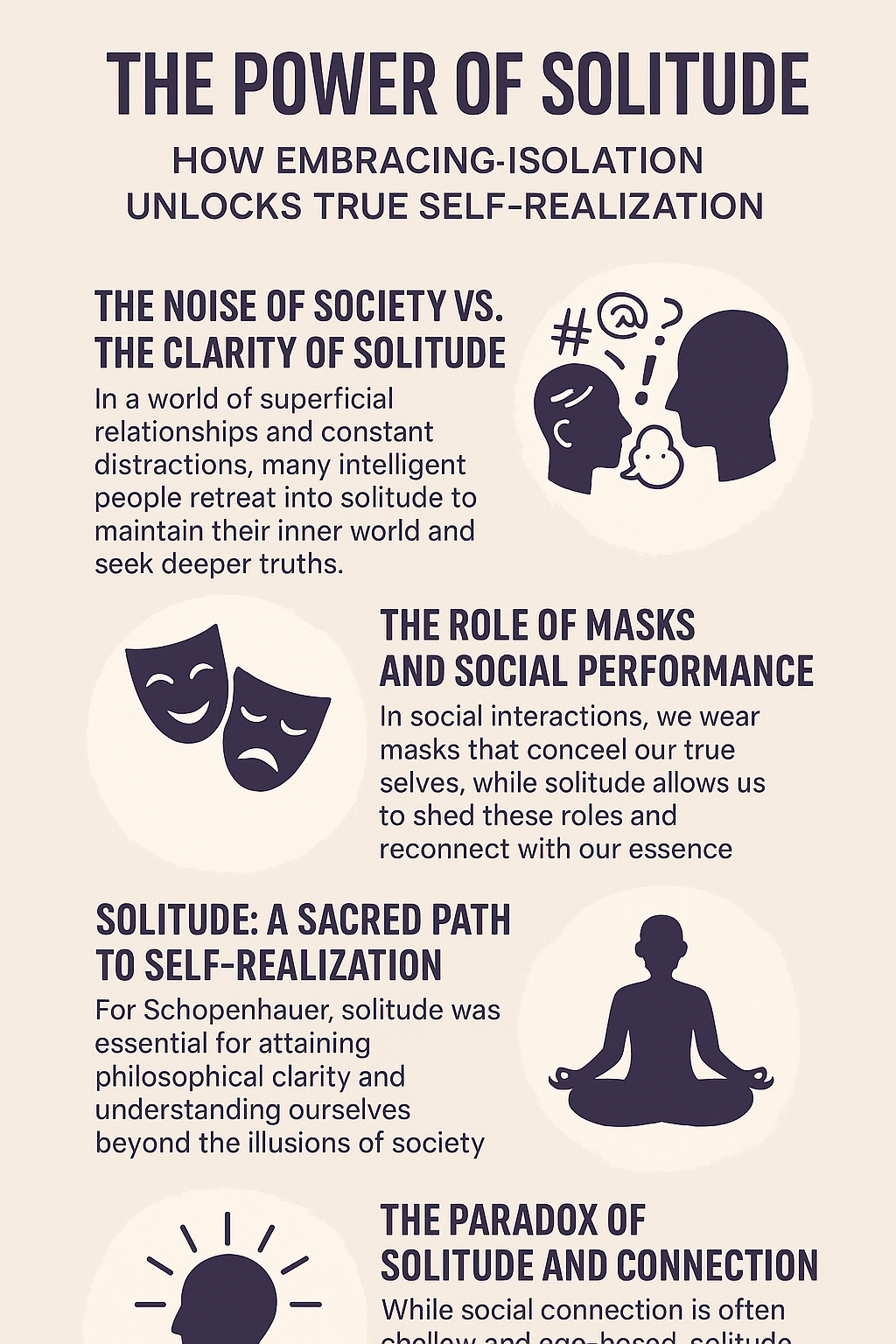In a world that constantly pushes for social engagement, groupthink, and superficial connections, many intelligent individuals find themselves retreating into solitude—not because they dislike people, but because they need space to preserve their inner world and seek deeper truths. This powerful reflection on solitude, inspired by the philosopher Arthur Schopenhauer, reveals why intelligent minds often retreat and how solitude becomes the sacred space where true self-realization happens.
The Noise of Society vs. the Clarity of Solitude
Schopenhauer’s philosophy begins with a brutal yet profound observation: much of social life is a distraction, a constant noise that drains rather than nourishes the mind. From gossip to trivial conversations, social media to obligatory gatherings, the modern world bombards us with an endless cycle of distractions that stifle authentic thought. For the thoughtful individual, this noise becomes unbearable, leading to withdrawal as a form of self-preservation. Solitude, then, is not a form of loneliness—it is a return to self.
In a world of endless chatter, Schopenhauer believed that those who think deeply are often alienated by the shallow nature of most social interactions. Unlike the average person, whose relationships are driven by a need for validation and ego boosts, the thinker seeks authentic connection—something that is all too rare in a world where most conversations are about fleeting concerns rather than profound truth.
The Role of Masks and Social Performance
One of the key reasons why intelligent individuals retreat into solitude is the need to constantly wear masks in social settings. In social interactions, we are often forced to adapt our behavior to fit into the expectations of others. This shapeshifting depletes the true self, leading to inner fragmentation. Schopenhauer observed that social life demands a constant performance of roles—an exhausting process that prevents individuals from living in their true essence.
In contrast, solitude offers a space free from these external expectations. It is a place where one can simply “be” without needing to adhere to any societal script. It is here, in silence and reflection, that intellectuals and creatives find the clarity and peace needed to nurture their inner worlds. The artist, the writer, the philosopher—these individuals often find their greatest work in the sanctuary of solitude, free from the noise of the world.
Solitude: A Sacred Path to Self-Realization
Schopenhauer didn’t see solitude as a withdrawal from life; rather, it was a necessary path to self-mastery and philosophical clarity. Solitude allows one to peel away the layers of illusion that society wraps around us. It is in the quiet moments, away from the hustle and bustle of the crowd, that we can truly confront our own fears, dreams, strengths, and weaknesses.
For Schopenhauer, solitude was a form of spiritual rebellion. It was not about misanthropy or rejecting society, but about stepping outside the distractions to understand both the world and oneself better. Those who embrace solitude do so not to escape life but to enhance their understanding of it, to gain clarity and wisdom that the noise of society can never provide.
The Paradox of Solitude and Connection
While many people crave social connection for validation, the intelligent mind seeks something deeper. Schopenhauer argued that genuine connection is built on mutual growth, authenticity, and shared exploration of truth—not ego-based interactions. Yet, for many intelligent individuals, such relationships are rare. They may feel disconnected even in the company of others because the conversation rarely touches the depth where their minds dwell.
In solitude, however, the intelligent individual finds connection with something far greater—an eternal, vast, and meaningful essence that cannot be found in the shallows of social interaction. This paradox—feeling more connected to the universe when alone than in the crowd—is at the heart of Schopenhauer’s philosophy. Solitude is not a sign of alienation, but a profound connection to the deeper aspects of existence.
The Final Truth: Embracing Solitude as a Path to Power
The highest form of self-realization, Schopenhauer believed, can only occur in solitude. It is in the stillness of our own minds that we confront the truth of who we are, free from the distractions and expectations of others. Solitude is not just a refuge from the noise of society; it is the space where intellectual and spiritual growth can flourish.
For those who embrace it, solitude becomes an act of personal power. It is a rebellion against the noise of the world, a declaration that one will not be consumed by the shallow demands of social validation. Instead, they will live life on their own terms, seeking truth, clarity, and meaning.
Schopenhauer’s life was a testament to this philosophy. He lived a largely solitary existence, finding fulfillment in books, writing, and reflection, rather than in social obligations. His belief was not born out of bitterness but out of a deep understanding of the human condition. He knew that to see clearly was sometimes to grieve deeply—because once you see beyond the illusions of society, you can never unsee them.
Solitude as a Gift, Not a Curse
If you are someone who feels most alive in the quiet moments, who craves intellectual depth over social entertainment, then you are not alone. Solitude is not a flaw to be fixed, but a gift to be embraced. It is the sacred space where your soul can breathe, your mind can think, and your spirit can expand.
In solitude, you find the power to live authentically. You stop seeking validation from others and begin to give to the world from your overflow—your wisdom, your creativity, your truth. Schopenhauer and other great minds knew that solitude was not a retreat from life, but the very foundation for living it fully.
The more you embrace solitude, the more powerful your presence becomes when you return to the world. You no longer speak just to speak—you speak with purpose. You no longer connect out of fear—you connect out of abundance. You are no longer a passenger in society; you are the author of your life. And this, Schopenhauer believed, is the true reward of solitude.
Conclusion
In a world that celebrates constant connection and social interaction, the philosopher and intellectual understand something profoundly different: true connection begins within. Solitude is not something to fear or apologize for; it is the space where we discover who we truly are. If you, like Schopenhauer, are drawn to the depths of your own mind, embrace it. For in the quiet, you will find your greatest strength, your truest self, and the peace that the world can never offer.
Here’s a point-by-point breakdown of the key concepts from the transcript:
- Introduction to Solitude and Intelligent Minds:
- The speaker introduces the paradox: why intelligent people tend to withdraw from social life.
- Social life is seen as a disguised burden for those who deeply reflect, and solitude is viewed not as loneliness but as liberation.
- The speaker promises a transformative insight at the end.
- Schopenhauer’s Philosophy of Solitude:
- Schopenhauer believed that social life often serves as a distraction or dilution of the self.
- The “noise” of gossip, trivial conversations, and social obligations drains the thinker.
- The most profound thinkers throughout history, like Newton, Kafka, Nietzsche, and Dickinson, often withdrew from society to preserve their inner world.
- Solitude is a fertile ground where intellectual and artistic brilliance can grow.
- The Role of Social Masks:
- Social life requires people to wear masks, adapting their speech, behavior, and tone to fit in, leading to fragments of the true self.
- Solitude allows people to shed these masks and return to their authentic selves.
- Schopenhauer’s idea: “the more unintelligent a man is, the less mysterious existence seems to him.”
- Disconnection and Frustration in Socializing:
- Social connections often become superficial, driven by ego boosts rather than truth or meaning.
- Schopenhauer suggested that intelligent people withdraw because they see social interactions as hollow.
- For the philosopher, interactions based on validation and entertainment are unsatisfying.
- The Paradox of Solitude and Connection:
- Solitude is not about rejecting others, but about preserving personal growth and authenticity.
- In solitude, intelligent individuals feel more connected to something vast and meaningful.
- Relationships must be based on mutual growth, shared exploration of truth, and authenticity, not convenience.
- The Shallow Nature of Social Life:
- Schopenhauer’s honesty exposes the shallowness of much of social life.
- Social life often lacks depth and true connection, causing intelligent individuals to withdraw and focus on themselves.
- Solitude offers clarity, while social noise feels like a performance.
- The Energy Drain of Social Obligations:
- Intelligent people don’t retreat from humanity but seek to preserve their minds from the constant energy drain of socializing.
- Schopenhauer was not misanthropic but believed that the thinker is often alienated because they see beyond the egotistical games of social life.
- The more self-aware someone becomes, the less they tolerate inauthenticity.
- The Rejection of Ego and Validation:
- People who are self-sufficient emotionally and intellectually often choose solitude because they are not seeking ego validation.
- Social life is a battleground for ego, status, and validation, while solitude offers self-sufficiency and deeper meaning.
- The intelligent mind seeks peace in solitude rather than external approval.
- Solitude as Nourishment for the Soul:
- For many intelligent individuals, solitude is a lifeline, helping them express themselves authentically without interruption.
- While solitude may be misunderstood as withdrawal or coldness by society, it’s often a source of nourishment and inner strength.
- Schopenhauer led a solitary life and found fulfillment in books, reflection, and writing, not in social obligations.
- The Journey to Self-Mastery through Solitude:
- Schopenhauer believed solitude was necessary for self-mastery and philosophical clarity.
- Solitude is not about isolation but about returning to the self, confronting one’s inner depths.
- Many thinkers, including Nietzsche, saw solitude as a sacred responsibility, the price of truth and personal growth.
- The Transformation of Solitude into a Path of Enlightenment:
- Solitude leads to personal enlightenment, allowing individuals to see beyond surface-level distractions and question societal norms.
- Through solitude, one becomes more aware of the inherent contradictions in society and starts to see truth beyond the noise.
- Schopenhauer saw solitude as the space for transcending suffering, which is rooted in the human will to live.
- The Importance of Solitude for Mental and Spiritual Health:
- Solitude allows for the cultivation of mental clarity and spiritual wholeness.
- Social rituals, which do not align with one’s true nature, drain life force and hinder personal growth.
- Once you’ve experienced the nourishing silence of solitude, the superficiality of social life becomes unbearable.
- Schopenhauer’s View on the Illusions of Social Life:
- Schopenhauer believed that most people seek approval and validation in social interactions, a pursuit that leads to disappointment and self-betrayal.
- Solitude breaks free from the folly of dependence on others for happiness, emphasizing self-reliance and internal fulfillment.
- Solitude, for Schopenhauer, is the path to genuine freedom and self-understanding.
- The Awakening through Solitude:
- The intelligent individual, when they embrace solitude, faces a confrontation with their true self.
- Solitude reveals inner strengths and weaknesses, gifts, and fears.
- Through solitude, individuals discover clarity about their values, desires, and boundaries, moving toward self-mastery.
- Schopenhauer’s Legacy: The Role of Solitude in Personal Power:
- Solitude for the intelligent soul becomes a space to find power, not over others, but over oneself.
- Schopenhauer believed solitude provides a true connection to the self, unlike the false connections in social life.
- Solitude nurtures creativity, thought, and personal growth, allowing individuals to express themselves authentically.
- The Paradox of Solitude and Connection:
- Solitude makes people more connected to their true selves, leading to greater peace and clarity.
- For those who value inner depth over superficial connection, solitude becomes an act of spiritual rebellion, rejecting external distractions.
- Schopenhauer’s Final Truth:
- The highest form of self-realization occurs in solitude, where one can confront inner truths free from external influence.
- The journey through solitude is uncomfortable but necessary for intellectual and spiritual growth.
- Solitude is not about rejecting society but transcending its noise to discover personal truth and purpose.
- Solitude as Liberation and Spiritual Rebellion:
- Embracing solitude is an act of defiance in a world of constant noise and social conformity.
- The intelligent person who chooses solitude becomes liberated, choosing meaning over comfort and depth over superficial connection.
- In solitude, one can contribute to the world from a place of abundance and inner clarity.
- The Final Insight: Solitude as the Ultimate Power:
- The intelligent soul who embraces solitude becomes sovereign, detached from society’s expectations, and fully aligned with their true self.
- Solitude is not a flaw; it’s the gift of deep personal power, spiritual clarity, and intellectual freedom.
- Those who seek truth and depth, like Schopenhauer, see solitude as the path to self-mastery and enlightenment.







